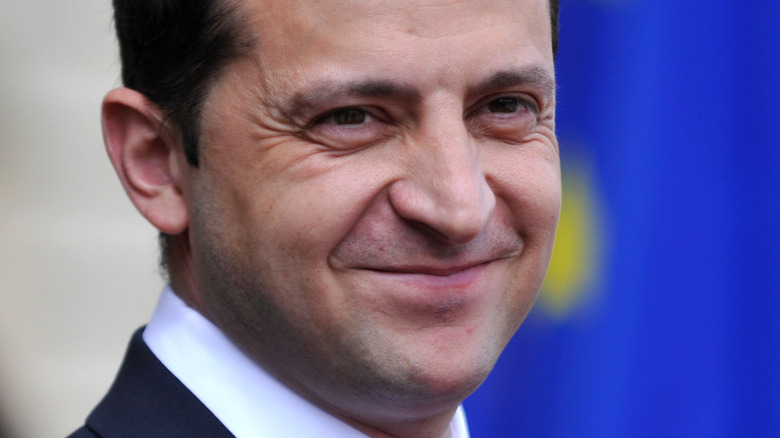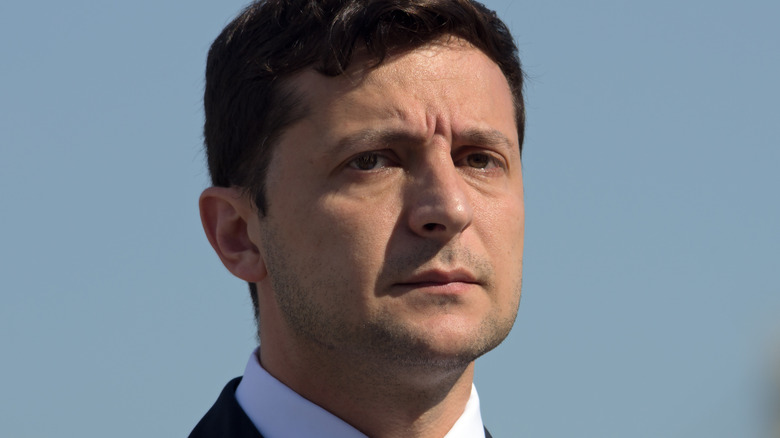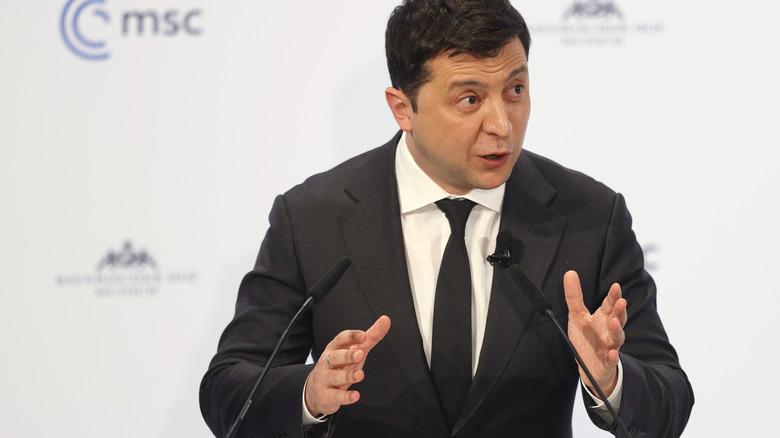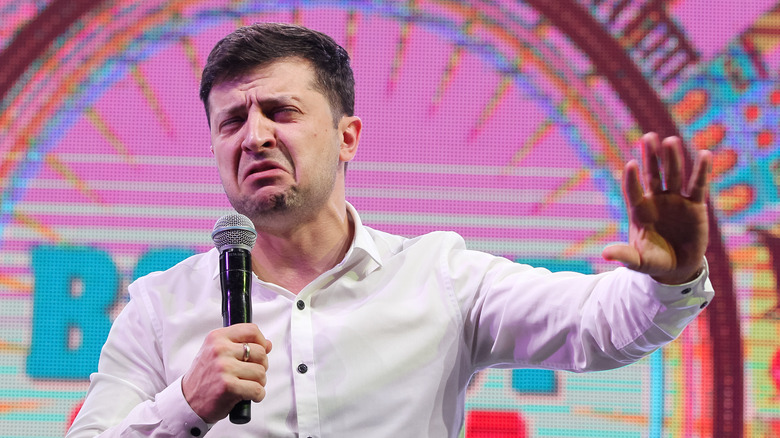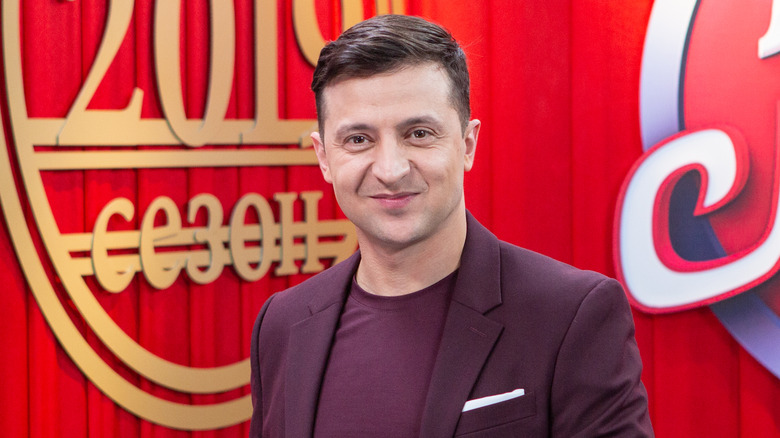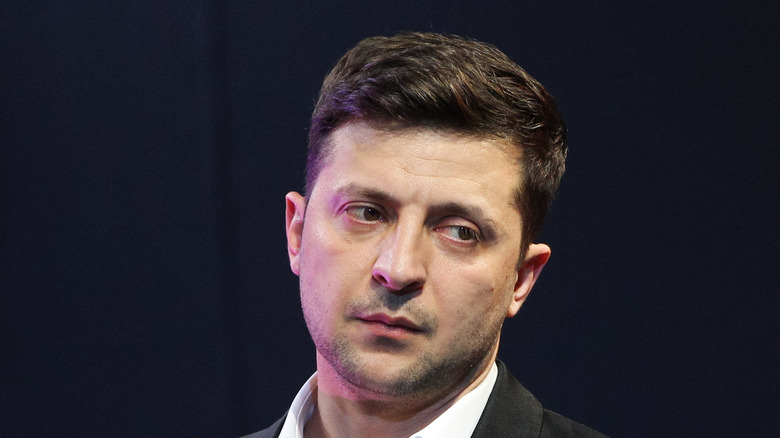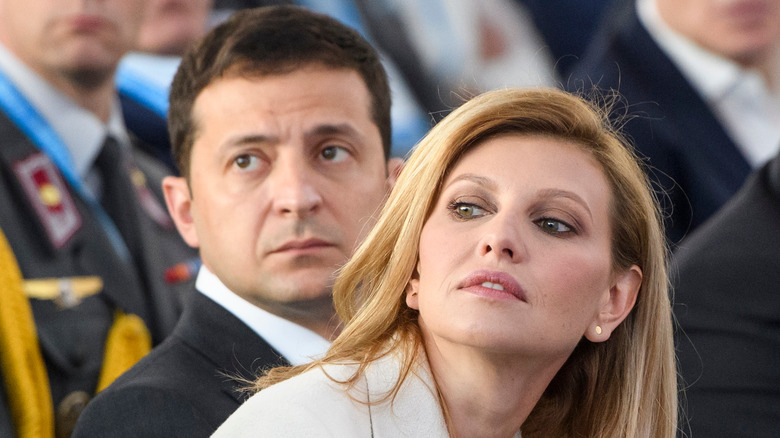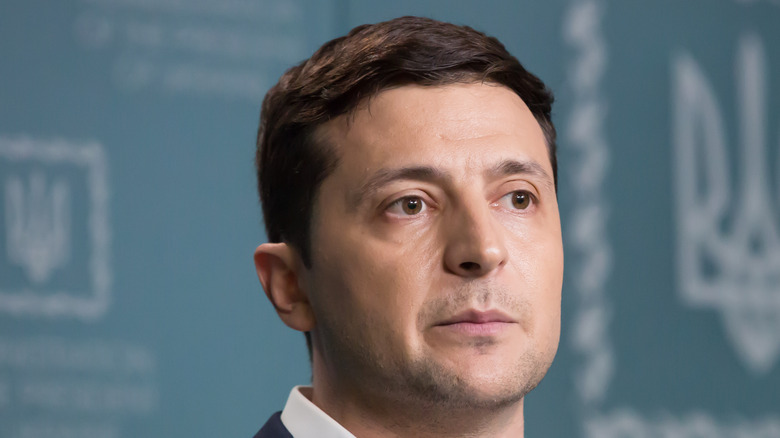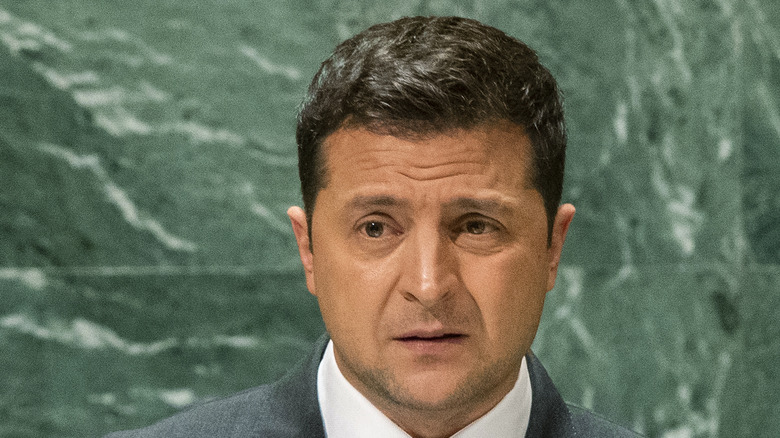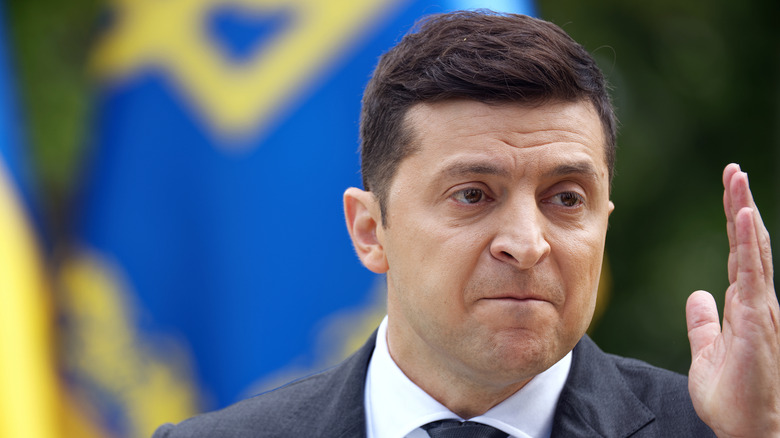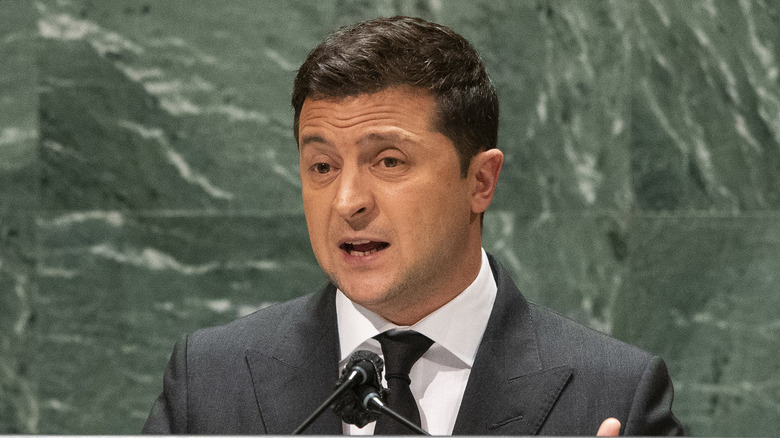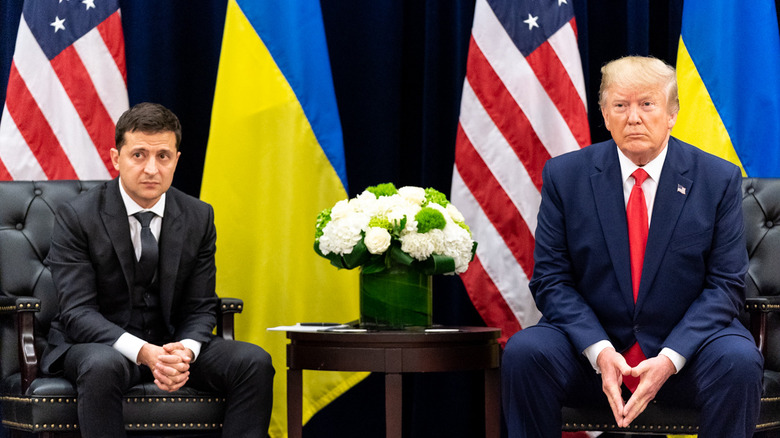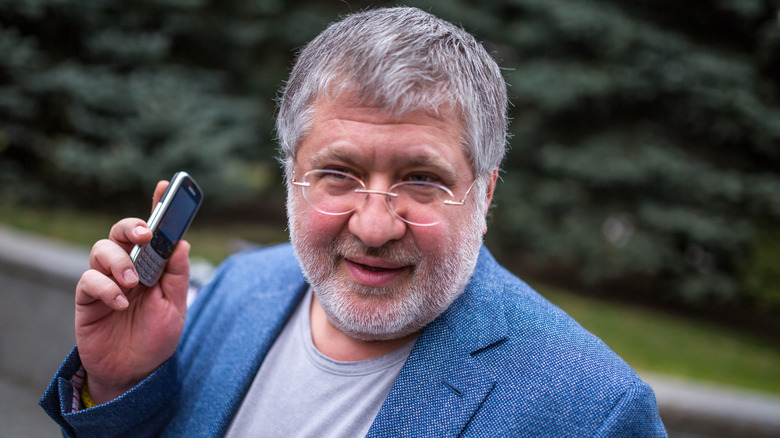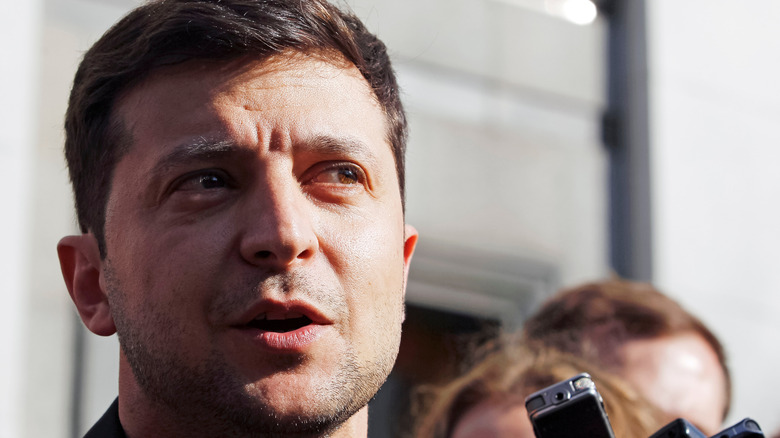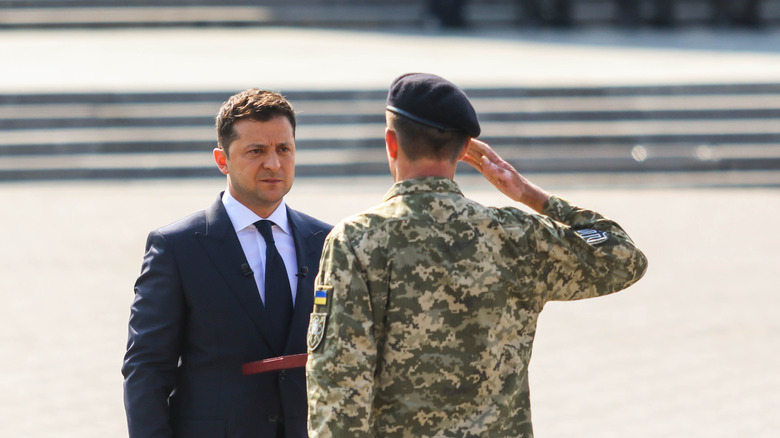The Untold Truth Of Volodymyr Zelensky
Ukrainian President Volodymyr Zelensky found himself dealing with a devastating crisis when Russian leader Vladimir Putin announced on February 24, 2022 that he was planning a "special military operation" in Ukraine that was "targeted toward multiple cities." According to Vox, explosions were heard in the capital city, Kyiv, and another city in the eastern part of the country, Kharkiv a short while after Putin made his announcement. A day later, Zelensky said that he knew Russia was focusing on eliminating him from the equation. He said in a statement, "According to the available intelligence, the enemy marked me as a target No. 1 and my family as the target No. 2" (via The New York Times).
Despite the challenges, the president stayed defiant and received praise across the world for his resilience during the invasion: per a Guardian report, Zelensky said that he wasn't leaving his country despite offers from the U.S. to evacuate him from Ukraine as things worsened. He added that what he really needed was access to ammunition and "not a ride."
Interestingly, Volodymyr Zelensky has an unconventional background — he wasn't familiar with the world of politics before he was elected the president of Ukraine in 2019. That said, he seems to have embraced his new role without hesitation. From being criticized as a politician to being celebrated for motivating Ukrainians during unprecedented times, he has come a long way.
Zelensky comes from a Jewish background
Per The BBC, Volodymyr Zelensky was born in Kryvyi Rih, a city in eastern Ukraine in 1978. His family is Jewish and had witnessed horrors during World War II. According to a video shared by The Kyiv Post on YouTube, the president narrated his story when he met Israeli Prime Minister Benjamin Netanyahu and revealed that his grandfather was the only one who managed to survive during the Holocaust — his grandfather's three brothers, their parents and other members of the family were "shot by German occupants who invaded Ukraine."
When Zelenksy declared that he was going to be a part of the 2019 elections, he received backlash from other Jewish people in Ukraine (via The New York Times). His critics were afraid. A Ukrainian rabbi, Shmuel Kaminezki explained, "They said, 'He should not run because we will have pogroms here again in two years if things go wrong.'" Still, the backlash was unexpected because religion was hardly discussed during the elections. Furthermore, Ukraine had a Jewish Prime Minister in 2019, Volodymyr Groysman. However, according to Kaminezki, certain members of the Jewish community were terrified of attracting attention. The rabbi explained, "They thought that if it is too big it will just cause antisemitism."
For his part, Volodymyr Zelensky didn't focus on his background but ensured that he was transparent about it during the elections. He said, "The fact that I am a Jew is about the 20th question among my characteristics."
His childhood was colorful
Volodymyr Zelensky, as detailed in an Atlantic profile, grew up in Kryvyi Rih, Ukraine, when the Soviet Union was starting to crumble. It was an unstable time that was marked by heavy violence on the streets as gangs sprang up in the city. However, Zelensky was lucky: his dad was a professor who taught computer science while his mom was an engineer. The family was relatively privileged and could afford a home in a decent area.
As a teenager, Volodymyr Zelensky was interested in playing the guitar and was a fan of English rock: at one point, he played music in an underpass and came back home with a guitar that had been broken into pieces. He wasn't discouraged, though. Zelensky turned to his friends and remarked, "I guess Kryvyi Rih isn't ready for us yet." Post the Soviet era, Zelensky got the opportunity to watch comedians perform as they openly cracked jokes on politics, something that had a huge impact on him and inspired him to explore comedy himself.
Zelensky was determined to pursue comedy
Volodymyr Zelensky was intrigued by comedy, according to The Atlantic: he was particularly interested in exploring improv and sketch comedy and was a fan of a popular show called "KVN" that welcomed participants from "across the old USSR" to entertain their audiences. Volodymyr Zelensky was just 17 years old when he joined the Kryvyi Rih squad as a budding comic. Later, he worked with his friends to start a comedy troupe known as the 95th quarter or Kvartal 95 (the name was a reference to an area in their city).
Per ABC News, Zelensky studied law at the Kyiv National Economic University and graduated in 2000, three years after he started Kvartal 95. By 2003, the comedy troupe had ventured into television and was producing TV shows. However, per The Atlantic, Zelensky's mom wasn't happy about her son's decision to chase a career as a comic and hoped that he would work as a lawyer instead. Zelensky was undeterred and continued working as an entertainer, participating in tours and performing for his audiences.
He chased a career as an actor for years
Volodymyr Zelensky, according to The Atlantic, had to be patient while trying to make a name for himself in the entertainment space. It would be years before he would achieve success in the competitive industry and become a household name. He worked as an actor and his films were often made in Russian, a move that allowed him to reach more people. According to Forbes Ukraine, by the year 2012, Zelensky's company was doing well for itself and its income was reportedly $15 million.
Per IMDb, Zelensky has worn a number of hats in the past and has worked as an actor, producer, writer, and director. Some of his films from the comedy genre include a 2018 film titled "Me, You, He, She," the 2014 movie "Love In Vegas," and a TV film that was released back in 2005 called "The Three Musketeers."
Zelensky has spoken up for Russian artists
As an entertainer, Volodymyr Zelensky wanted to ensure that all artists had the right to showcase their work in Ukraine and even spoke up on social media in 2014, stating that he was against the idea of banning Russian artists from performing in the country. According to Parade, Zelensky's outspoken views caused trouble for the artist and one of his films, "Love In The Big City 2," was banned in Ukraine. Later, he decided to make a generous donation to the Ukrainian army which prompted many Russian politicians to declare that Zelensky's work should not be showcased in Russia.
Here's some context: According to The Atlantic, Zelensky and his group, Kvartal 95 made the decision to distance themselves from the Russian market after Putin took over Crimea in 2014. An angry Zelensky told one of his friends that he didn't "want to have anything in common with Russia" and proceeded to donate one million hryvnias (around $33,238) to the army, upsetting several Russian politicians who wanted his work to be banned.
His wife is a humanitarian
Olena Zelenska, the first lady of Ukraine, said in an interview with the Diplomatic Courier that she wants to use her position to talk about social causes close to her heart. She said that she aimed to learn as much as she could by interacting with first ladies from other countries such as Canada, France, Israel, and Japan. "We should care about the issues that concern the whole world — health, education, gender equality," she said.
She added that as a parent, she's quite invested in "child nutrition and its connection to both health and education" which prompted her to work with Ukraine's ministries to focus on a "new school nutrition program" that can be useful for students across the country. Zelenska said that the program "can improve their health so that they can improve their learning."
According to a report by 1+1, The State Food and Consumer Service conducted inspections in Ukrainian schools and discovered that there was a rise in the amount of "unsafe food" items present in schools across the country. Zelenska's nutrition program aimed to introduce reforms in Ukrainian schools to tackle the issue on a larger scale. She was quoted as saying, "Five days a week, children spend almost all day away from home and cannot control what they eat and what they buy in the school cafeteria."
Zelensky was the president in a highly popular TV show
Volodymyr Zelensky's big break on television was 2015's "Servant of the People," a TV show where he played the role of a high school teacher, Vasily Goloborodko. According to Foreign Policy, the plot is intriguing: Goloborodko becomes a popular figure among the Ukrainian public after they watch a YouTube video of the teacher (uploaded by his students) speaking at length against corruption. He is ultimately chosen to lead Ukraine as its president after receiving more than 60% of the votes.
The TV show was produced by Zelensky's company, Kvartal 95 — its team made the conscious decision to highlight corruption in the country while openly mocking Ukraine's "political elite." Volodymyr Zelensky explained that "the best way to make sure Ukrainians don't come to accept the current state of affairs as normal is to put these [political] absurdities in a new format."
One of the writers who worked on the show, Andrey Yakovlev, told Foreign Policy, "It's not a story about how things are, but how they should be. That's why people are watching it." The TV show was wildly popular and bigwigs in the TV industry got involved. Fox Studios bought adaptation rights and Netflix decided to acquire the show and stream it for subscribers around the world.
His campaign was unusual
According to ABC News, the popularity of "Servant of the People" inspired the team behind Kvartal 95 to form a political party called ... the Servant of the People. Volodymyr Zelensky rose to the challenge in 2018 and declared that he would be running for president. His campaign was unlike any other: as a comic, Zelensky was often spotted at tours around Ukraine where he made it a point to crack jokes on his opponents.
He declared that he would fight corruption in the country if he was chosen as the next president. Additionally, he embraced social media to talk about his campaign. It worked: Zelensky won over 73% of the votes and was sworn in as the president in May 2019. As highlighted by The New Yorker, Zelensky made several promises during the campaign and said that he would work hard to resolve differences with the Russian government and "bring peace to the Donbass," a disputed region in eastern Ukraine. He didn't really specify how he would achieve his goals or overcome the difficulties that his predecessors had faced but still impressed Ukrainian voters.
Here's an example worth noting: In a debate, the presidential candidate told his opponent, former President Petro Poroshenko, "I am the result of your mistakes," an undoubtedly powerful line that didn't go unnoticed.
Zelensky was criticized for being an unconventional candidate
Not everyone was thrilled when it was announced that Volodymyr Zelensky was going to be Ukraine's next president and several individuals expressed their doubts about his ability to lead Ukraine. Per ABC News, Zelensky told the Ukrainian public after winning the election in 2019, "I promise, I will never let you down." A journalist and researched from Kyiv, Olga Tokariuk said back then that Zelensky was simply chosen because "he was a recognizable face." She added that his promises were "vague" and he didn't "actually have any concrete electoral program."
Meanwhile, an international relations professor from the University of Melbourne, Sara Meger pointed out that the Ukrainian public was frustrated with the government and simply didn't want "a small number of extraordinarily wealthy individuals" to lead anymore. Meger added, "[Zelensky] represented a radical shift away from that oligarchic power that had a stranglehold on Ukrainian politics."
Additionally, Moscow's reporter for The New Yorker, Joshua Yaffa told NPR in a conversation that Volodymyr Zelensky had an advantage during the elections. He said, "... it was clear the Ukrainian people were desperate for an alternative – any alternative — and Zelensky showed up on the political scene and benefited from his lack of experience, frankly."
He is very vocal on social media
President Volodymyr Zelensky is a lot more interested in communicating with his fellow Ukrainians on social media than he is in engaging with the press. According to the Atlantic Council, he mostly avoided traditional media outlets in his first year as president — this was also a trend that was observed during the elections when Zelensky often preferred to communicate on platforms such as YouTube, Instagram, and Twitter instead of talking to journalists.
Local media outlets weren't pleased and alleged that the president was running away from "awkward questions." The one exception was a "press marathon" of sorts that was held in October 2019: Zelensky started speaking to members of the press from 10 a.m. and continued engaging with around 300 reporters "until beyond midnight," dealing with over 500 questions.
Even during the 2022 Russian-Ukrainian crisis, Volodymyr Zelensky regularly posted on his social media accounts on platforms such as Twitter and Instagram to ensure that he was interacting directly with the public and keeping them updated.
Volodymyr Zelensky was a part of Donald Trump's impeachment
Early in his presidency, Volodymyr Zelensky was a part of phone call in July 2019 that would be instrumental in Donald Trump's impeachment. According to The Boston Globe, the Ukrainian president requested Trump send more aid from the U.S., to which Trump said that he needed Zelensky to "investigate Democrats" as a "favor." Before Trump was impeached, the U.S. House of Representatives claimed that Trump allegedly held onto "millions of dollars in military aid" that were meant for Ukraine in order to "pressure" Zelensky to state that he was launching an investigation into Trump's political rival Joe Biden.
Per ABC News, Trump apparently held onto as much as $400 million that was earmarked to help Ukraine, and later claimed that he didn't do anything wrong. Also, Volodymyr Zelensky tried his best to arrange a White House meeting with Trump, hoping to "bolster his mandate to confront Russia" but didn't succeed (via Politico). He is on better terms with Biden and even visited the White House in 2021.
Volodymyr Zelensky had a close connection with controversial billionaire Igor Kolomoisky
According to a piece by Radio Svoboda, Ukrainian Oligarch Igor Kolomoisky was closely linked to Volodymyr Zelensky before he was elected: the two worked with each other in a professional capacity when Zelensky was still working in the entertainment industry. According to Kolomoisky, the two got to know each other better over the years and even exchanged greetings on special occasions like birthdays.
Meanwhile, as reported by The New York Times, Kolomoisky got into serious trouble in 2021: the U.S. government announced sanctions on the businessman (he had previously been accused of embezzlement and fraud) and he and his family were banned from visiting the U.S. on account of his "involvement in significant acts of corruption." At that point, Zelensky said that he was not "beholden" to Igor Kolomoisky.
Furthermore, according to The BBC, the Ukrainian president took a strong stand against rich businessmen in the country in March 2021 and said, "We are building a country without oligarchs. We are killing the idea of an oligarch system in our country." This made sense considering the fact that Ukraine had been struggling to get rid of the oligarchs' strong influence: It didn't help that many of them had political parties of their own in the past and "supportive television stations." As a part of his promise to fight corruption in the country, it was perhaps essential for Zelensky to distance himself from the oligarchs.
He was keen on resolving differences with Russia
During the 2019 election campaign, Volodymyr Zelensky had assured his fellow Ukrainians that he would work on mending things with Russia and figure out a way to move forward. However, this was more complicated than he realized: according to a CSR report, Zelensky tried his best to initiate dialogue with Russian President Vladimir Putin in order to find a solution to Russia's "ongoing occupation of Ukraine's Crimea" and certain regions in eastern Ukraine. Unfortunately, Russia didn't participate in the talks and didn't seem to want to implement "a permanent ceasefire" or call off its troops from Ukraine.
Per The BBC, right before the 2022 invasion took place, the Ukrainian president spoke about how Putin had ignored his requests. "I initiated a telephone call with the president of the Russian federation. Result: silence," he said before adding that Russia had around 200,000 troops and "thousands of combat vehicles on Ukraine's borders." Additionally, Zelensky requested Russia to avoid going into war and said, "Who can stop [the war]? People. These people are among you, I am sure."
Zelensky's reputation was suffering before Russia's invasion
According to ABC News, members of the public weren't pleased with Zelensky and his approval rating had dropped to 25% by October 2021. The main reason was the fact that the president had not managed to find a solution for the conflict in Donbas, coupled with economic issues such as a rise in the cost of gas, electricity, and water. Olga Oleinikova, Director of the Ukraine Democracy Initiative at the University of Technology Sydney, said in a statement, "People are really not happy with him at the moment."
Additionally, corruption challenges still plagued the government, something that didn't help Zelensky's reputation. There was another problem: as pointed out by The Wilson Center, Ukraine had seen a common trend of people quickly losing faith in a new president because voters often had "unnaturally high expectations of their candidate" and found it difficult to accept the "lack of tangible achievements" in the period following the election. Additionally, former candidates had also often disappointed their voters by not addressing their election pledges after being sworn in.
